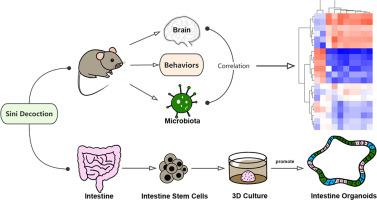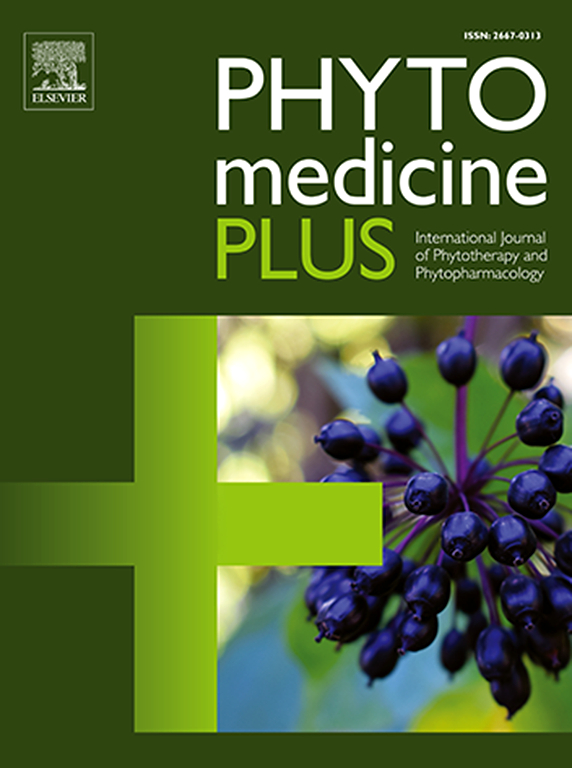四逆汤通过双调节血清素能生物合成减轻抑郁样行为,促进肠道干细胞再生
Q3 Pharmacology, Toxicology and Pharmaceutics
引用次数: 0
摘要
抑郁症是一种常见的慢性情绪障碍,最近的研究表明,人们对草药治疗抑郁症的兴趣越来越大。四逆汤(SND)已在治疗实践中使用了数百年。虽然SND显示了治疗抑郁症的潜力,但其分子途径和对神经信号传导(如5-HT神经传递)和肠道微生物群稳态的双重作用仍未被探索。目的本研究探讨了SND抗抑郁作用的尚未解决的机制,特别关注其与肠道干细胞动力学和肠-脑轴的相互作用。方法采用慢性轻度应激模型建立抑郁模型。SND处理后,通过悬尾试验、强迫游泳试验、蔗糖偏好试验和野外试验评估行为变化。检测不同脑区的5-HT水平,并通过16S rRNA测序测量肠道微生物群的变化。研究了SND对肠道干细胞的影响。结果丹参可减轻抑郁引起的体重下降和行为障碍,提高血清素代谢。肠道菌群分析显示,SND显著增加了Adlercreutzia、Allobaculum、Blautia和Parabacteroides的丰度,这些微生物属有可能帮助身体应对抑郁压力。这些微生物变化与血清素水平和行为参数有很强的相关性。此外,SND刺激肠道干细胞增殖和分化,对上皮细胞再生产生长期影响。结论SND可能通过调节肠-脑-微生物群轴发挥抗抑郁作用,突出了其在微生物调节和肠道内稳态中的双重作用。本文章由计算机程序翻译,如有差异,请以英文原文为准。

Sini decoction (SND) mitigates depressive-like behaviors through dual modulation of serotonergic biosynthesis and promotes intestinal stem cell regeneration
Background
Depression is a common chronic mood disorder, and recent research has shown growing interest in herbal medicine for its treatment. Sini decoction (SND) has been used in treatment practice for hundreds of years. Though SND demonstrates therapeutic potential for depression, its molecular pathways and dual effects on neural signaling (e.g., 5-HT neurotransmission) and gut microbiota homeostasis remain unexplored.
Purpose
This study examines the unresolved mechanisms of SND's antidepressant effects, focusing specifically on its interactions with intestinal stem cell dynamics and the gut-brain axis.
Methods
Depression was modeled using chronic mild stress. After SND treatment, behavioral changes were assessed using the tail suspension test, forced swimming test, sucrose preference test, and open field test. 5-HT levels in different brain regions were detected, and gut microbiota alterations were measured by 16S rRNA sequencing. The effect of SND on intestinal stem cells was then studied.
Results
SND alleviated depression-induced body weight loss and behavioral impairments while enhancing serotonin metabolism. Gut microbiota analysis revealed SND significantly increased the abundance of Adlercreutzia, Allobaculum, Blautia, and Parabacteroides, which are microbial genera with the potential to assist the body in coping with depressive stress. These microbial changes showed strong correlations with serotonin levels and behavioral parameters. Furthermore, SND stimulated intestinal stem cell proliferation and differentiation, exerting long-term effects on epithelial regeneration.
Conclusion
Our findings indicate that SND exerts antidepressant effects potentially through modulating the gut-brain-microbiota axis, highlighting its dual role in microbial regulation and intestinal homeostasis.
求助全文
通过发布文献求助,成功后即可免费获取论文全文。
去求助
来源期刊

Phytomedicine Plus
Medicine-Complementary and Alternative Medicine
CiteScore
3.70
自引率
0.00%
发文量
178
审稿时长
81 days
期刊介绍:
 求助内容:
求助内容: 应助结果提醒方式:
应助结果提醒方式:


